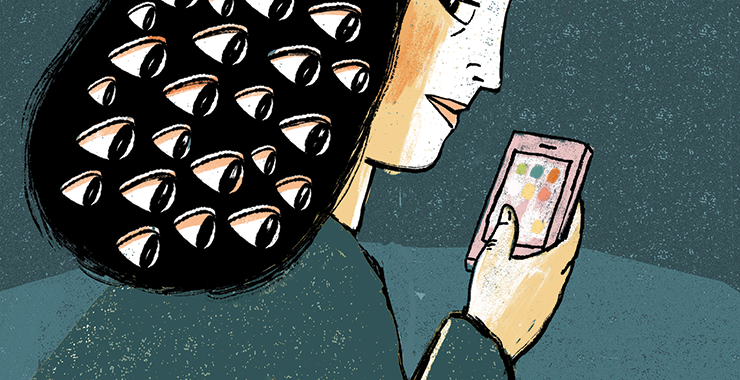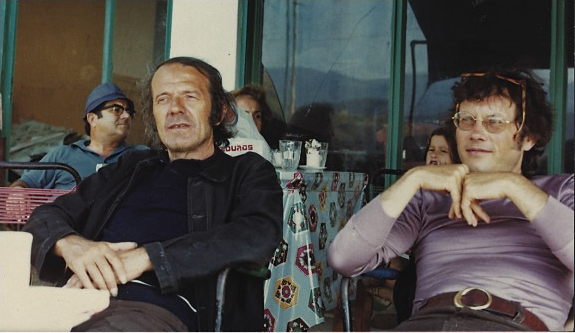Dear Hivers,
After years of passive observation of the processes that are reducing our privacy to an illusion, I’ve decided to take the leap - or more exactly the uncountable leaps - towards reclaiming practically that irreducible human right: not to authorize access to my personal data without having granted my consent for somebody or some entity to obtain that access.
I found useful to shed here some light on the reasons why privacy has become so crucial in my everyday routines: it’ll help understand part of the analysis I’m going to publish next week around the “dark side of Chivo” (the Lightning Network wallet the Salvadoran government is inviting us to use for our daily BTC transactions).

Shifting from the disciplinary societies to the societies of control
Most of us know that our privacy is trampled and shattered from the very moment we turn on virtually any electronic device, through techniques that gather a wide array of institutional actors: many States, and all the companies to which we deliver our information on a daily basis (Zoom, the expropriated by Google version of Android, the banking sector, Facebook, TikTok, etc.).
This phenomenon has begun quite a long time ago, so much that in 1990 (31 years ago!) the French philosopher Gilles Deleuze wrote a short text explaining the very mechanisms we’re now confronted with, in what he defines as a “Society of Control”: “Post-scriptum sur les sociétés de contrôle” (here’s its English translation: https://thefunambulist.net/history/deleuze-foucault-and-the-society-of-control).
Allow me to quote two steps of his interpretation, so vividly applicable to our situation, 3 decades later:
“[The disciplinary societies] reach their height at the outset of the twentieth [century]. They initiate the organization of vast spaces of enclosure. The individual never ceases passing from one closed environment to another, each having its own laws: first the family; then the school (“you are no longer in your family”); then the barracks (“you are no longer at school”); then the factory; from time to time the hospital; possibly the prison, the preeminent instance of the enclosed environment. It’s the prison that serves as the analogical model (…)”
“In the disciplinary societies one was always starting again (from school to the barracks, from the barracks to the factory), while in the societies of control one is never finished with anything–the corporation, the educational system, the armed services being metastable states coexisting in one and the same modulation, like a universal system of deformation. (…) Felix Guattari has imagined a city where one would be able to leave one’s apartment, one’s street, one’s neighborhood, thanks to one’s (dividual) electronic card that raises a given barrier; but the card could just as easily be rejected on a given day or between certain hours; what counts is not the barrier but the computer that tracks each person’s position–licit or illicit–and effects a universal modulation”.

From left to right: Gilles Deleuze and Félix Guattari
At the end of the 1980’s, Guattari and Deleuze were describing exactly the way CBDCs, those currencies that are anti-crypto by essence, will try to track and subject our lives within a couple of years (and are already subjecting the lives of the Chinese citizens).
While being confronted with such an overwhelming landscape, Gilles Deleuze answers by an invitation. He had reached the conclusion that in a "Society of control", where the main requirement from the powers that shape our lives is: "Communicate", the most effective form of resistance is to remain silent. For years now, for example, I have hardly ever taken my mobile phone away when I hit the street - a basic and free of charge measure of self-preservation, which could well become illegal in a not too distant future.
That Deleuze’s message in a bottle will serve as a throughline in our reflection, and all my future posts about privacy: the only totally secure data is the one we don’t express.
Let’s now break down why it’s fair, legitimate and urgent to leave as few traces as possible on the Internet.
The presumption of innocence
I'm not yet an elder, hehe, but my whole youth has been immersed in the concept that "When facing an accusation, everyone is innocent until proven guilty” (this ancestral Justice and legal principle is formulated in latin as follows: “Ei incumbit probatio qui dicit, non qui negat", i.e. the burden of proof is on he who declares, not on he who denies).
Today, the perception of the right to privacy many people tolerate to be limited to seems to work the other way around, based on the popular doxa: "He who has nothing to hide has nothing to fear". Under this motto, it has become legitimate for many of us that a company providing an e-mail service stores the content of our communication for an unlimited period, exploits it for advertising purposes and passes it on to the police and law enforcement agencies, even if they have not been obliged to do so.
It’s now almost seen as common sense to believe that: "it's a free of charge email service (or cryptocurrency wallet), I have to accept that here I am the product". As a result, in a time span of 30 years, the "new normal" has become: "Let them read all my personal data if they want to, since I don't have anything worthy enough to conceal".
Such a reasoning underestimates two factors: first, what private companies and State authorities "feel like" controlling and monitoring is subject to change, sometimes at lightning speed (involuntary play on words). Two years ago Turkey brought an example of such a move: any taxpayer who doesn't pay online at least 50% of his taxes - that is, through companies that profit from our transfers - now receives a fine from the State; similarly, in nowadays China you have to scan a QR code even to get into your own office or apartment - goodbye to the freedom of not using a mobile phone, and not being geolocated at all times…).
Second, the value and validity of individual freedom is rooted in the very exercise of this freedom: we are free because we practice our freedom, not because an outside instance (a State, a Church, a social network,...) gives us the “right” to be free. Therefore, it is because WE KNOW that we have not committed any illicit act (or at least no injustice) that we sovereignly reject any attempt to force us to account for and expose our personal life, wherever the demand to hand over data may come from.
(To be continued :-))
Posted Using LeoFinance Beta
Lightening Network is actually very private by design and there are lots of non Chivo wallets that work just as well if not better.
In fact by using multiple Lightning Wallets and moving funds to and from Hive using @brianoflondon’s bridge you can achieve a high level of privacy.
Absolutely, that’s what we’re poised to do from our cryptoeducation initiatives here 🙃.
The challenge being to demostrate to enough « Chivo » users the benefits of installing and using another LN app, i.e. educating them around privacy (« Chivo » is fully KYCd) and custodial/non custodial topics.